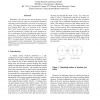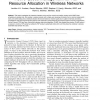529 search results - page 31 / 106 » A Fair Non-repudiation Protocol |
PODC
1990
ACM
13 years 11 months ago
1990
ACM
Three self-stabilizing protocols for distributed systems in the shared memory model are presented. The first protocol is a mutual exclusion protocol for tree structured systems. T...
MOBICOM
2000
ACM
14 years 1 days ago
2000
ACM
—Fairness is an important issue when accessing a shared wireless channel. With fair scheduling, it is possible to allocate bandwidth in proportion to weights of the packet flows ...
LCN
2006
IEEE
14 years 1 months ago
2006
IEEE
IEEE 802.11 has become the main technology in local area wireless networks. However, performance anomalies, especially, in terms of fairness, arise in its use in ad hoc networks. ...
TMC
2008
13 years 7 months ago
2008
This paper investigates the interaction between end-to-end flow control and medium access control (MAC)-layer scheduling on wireless links. We consider a wireless network with mult...
WSC
2008
13 years 10 months ago
2008
Class Based Weighted Fair Queueing (CBWFQ) is a very important router discipline that allows different types of Internet Protocol (IP) traffic like voice, video, and best effort d...


